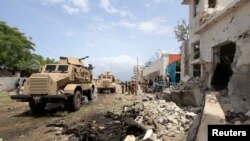UNITED NATIONS —
The U.N. Security Council is considering authorizing 4,000 additional troops for African Union operations in Somalia, where Somali and African forces are battling al-Shabab militants.
U.N. Secretary-General Ban Ki-moon is supporting the African Union request for a short-term surge to bolster its nearly 18,000-strong AMISOM force, which would receive an additional three infantry battalions totaling 2,550 troops, and support units of nearly 2,000 additional uniformed personnel.
Although AMISOM is an African Union mission, it operates under a U.N. mandate with international financing.
The troops would be deployed for 18 to 24 months to reinvigorate efforts to eliminate al-Shabab, the al-Qaeda-linked militant organization that claimed responsibility for last month's terror attack at a Kenyan shopping mall that killed more than 60 civilians.
The group has been weakened but continues to recruit substantial numbers of fighters and carry out attacks.
According to U.N. Deputy Secretary-General Jan Eliasson, who briefed the Security Council Wednesday following a two-day visit to Mogadishu, although 18 months of successful operations have uprooted al-Shabab in major cities, the campaign by AMISOM and Somali forces has recently ground to a halt.
“The AMISOM Force Commander told me that neither AMISOM nor the Somali army has the capacity to push beyond areas already recovered," he said. "Their hold of the existing territory would be tenuous if the current status quo continues, he claimed.”
Eliasson said a temporary boost is needed to hold gains and respond to evolving threats from the extremists.
“The recommended enhancements for AMISOM, including helicopters and other enablers, will allow the force to regain the initiative against the insurgency and to recover strategic locations that are exploited by al-Shabab to generate revenue, and to recruit and train combatants.”
The secretariat is also seeking non-lethal and logistical support for the Somali government's forces, including transport, tents, food, fuel, and medical support.
Somalia’s Deputy Prime Minster Fawzia Yusuf Adam urged the Security Council to support the request to bolster the Somali army, saying it is necessary to enhance their capacity so they can defeat al-Shabab.
A resolution drafted by Britain authorizing the temporary troop increase and support for Somali forces is expected to be circulated later this week among Council members. It may come to a vote by mid-November.
U.N. Secretary-General Ban Ki-moon is supporting the African Union request for a short-term surge to bolster its nearly 18,000-strong AMISOM force, which would receive an additional three infantry battalions totaling 2,550 troops, and support units of nearly 2,000 additional uniformed personnel.
Although AMISOM is an African Union mission, it operates under a U.N. mandate with international financing.
The troops would be deployed for 18 to 24 months to reinvigorate efforts to eliminate al-Shabab, the al-Qaeda-linked militant organization that claimed responsibility for last month's terror attack at a Kenyan shopping mall that killed more than 60 civilians.
The group has been weakened but continues to recruit substantial numbers of fighters and carry out attacks.
According to U.N. Deputy Secretary-General Jan Eliasson, who briefed the Security Council Wednesday following a two-day visit to Mogadishu, although 18 months of successful operations have uprooted al-Shabab in major cities, the campaign by AMISOM and Somali forces has recently ground to a halt.
“The AMISOM Force Commander told me that neither AMISOM nor the Somali army has the capacity to push beyond areas already recovered," he said. "Their hold of the existing territory would be tenuous if the current status quo continues, he claimed.”
Eliasson said a temporary boost is needed to hold gains and respond to evolving threats from the extremists.
“The recommended enhancements for AMISOM, including helicopters and other enablers, will allow the force to regain the initiative against the insurgency and to recover strategic locations that are exploited by al-Shabab to generate revenue, and to recruit and train combatants.”
The secretariat is also seeking non-lethal and logistical support for the Somali government's forces, including transport, tents, food, fuel, and medical support.
Somalia’s Deputy Prime Minster Fawzia Yusuf Adam urged the Security Council to support the request to bolster the Somali army, saying it is necessary to enhance their capacity so they can defeat al-Shabab.
A resolution drafted by Britain authorizing the temporary troop increase and support for Somali forces is expected to be circulated later this week among Council members. It may come to a vote by mid-November.




